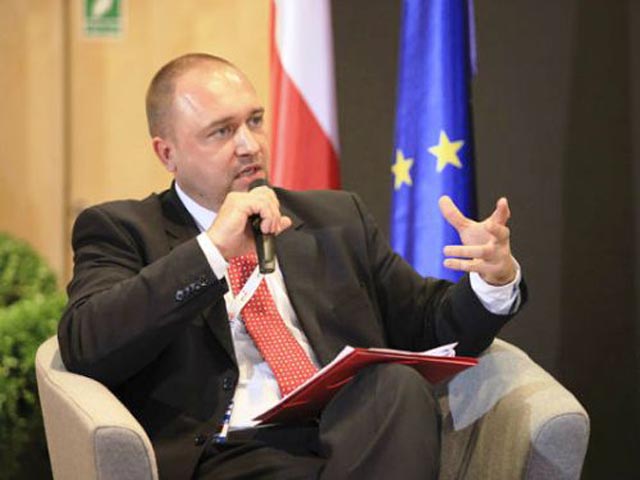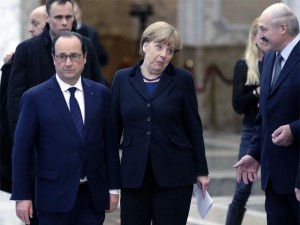Poland and Germany were both initiators and drivers of a New Eastern policy linked to the Eastern neighborhood and Russia/Soviet Union.
Ulad Vialichka: The Eastern Partnership Civil Society Forum doesn’t need radical changes now

The transformations of the Eastern Partnership Civil Society Forum have already been introduced. Now what the Forum needs is concrete definition of the directions that have already been launched.
On January 28-29 the meeting of the Steering Committee of the Eastern Partnership Civil Society Forum (EaP CSF) took place in Brussels.
Ulad Vialichka, the head of the International Consortium “EuroBelarus”, was elected to be the co-chair of the Steering Committee. He has already performed this role in 2010-2011; now he substituted another Belarusan on this position — Andrei Yahorau, who used to be the co-chair in 2015 up until the Forum in Kyiv in November 2015.
On the same day as the meeting of the Steering Committee of the Eastern Partnership Civil Society Forum in Brussels the mass media published a tough statement of the Witold Waszczykowski, the Minister of Foreign Affairs of the Republic of Poland, that the Eastern Partnership came to be a failure.
Ulad Vialichka told the EuroBelarus Information Service about the meeting of the Steering Committee, about his plans at the position of the co-chair of this structure, as well as evaluated the statements of the Polish Foreign Ministry.
— The first meeting of the newly elected membership of the Steering Committee elected during the November Assembly of the Eastern Partnership Civil Society Forum in Kyiv was taking place in Brussels with the participation of the Secretariat of the EaP CSF and a number of quests from different structures of the European Commission. The Steering Committee discussed the prospects of the next period in the Forum’s life and contacts and relations both inside the structure, as well as with the partners in Brussels and other European capitals.
The meeting made it possible to define some priorities. One of them will be the attempt to evaluate the main effects for the Eastern Partnership from the influence of the civil society as represented by the Forum as an institutional part of the EaP initiative.
— It was on January 29 that the new Polish Foreign Minister criticized the Eastern Partnership program, which predetermined its members the role of buffer zone between Russia and the EU: “We discarded this concept as wrong. Eastern Partnership was creating an illusion, but gave no chance for these countries to get membership in the EU. The policy adopted by the former government ended in catastrophe since the EuroMaidan questioned it.” What has caused such harsh criticism of the EaP initiated in 2008 by Poland?
— I have heard about this statement only on the way back in the airport; and, honestly, this statement puzzled me a lot. I didn’t expect such controversial comment at all.
On the one hand, the statement critically evaluated the whole Eastern Partnership. Such evaluation looks weird for me, since this initiative did bring certain benefits: Ukraine, Moldova, and Georgia signed the EU Association Agreements; their relations with Europe are advancing despite the recurring national turbulence.
On the other hand, the statement about the buffer role of Belarus instead of European prospects seems too categorical for me. It seems that the Polish Foreign Ministry addressed this statement to its political opponents from the Civil Platform and criticized the policy of the former government rather than really analyzing the successes and failures of the EaP.
European prospect of countries-neighbors in the East is, indeed, a very important issue that has always worried the Civil Society Forum. However, in today’s European realities it is not always clear, who and how can raise this issue. For example, today the referendum regarding EU Association Agreement with Ukraine that is to take place in Holland is the biggest threat for Ukraine’s further rapprochement with Europe. If the Dutchmen vote against the ratification of the Association Agreement, it will be a serious and unexpected hindrance on the way of Ukraine’s Eurointegration.
As a matter of fact, there are quite a number of challenges in Europe’s rapprochement with its Eastern neighbors; but to call it a catastrophe means to speculate the facts.
— What do you see as your chief task in the position of the co-chair of the Steering Committee of the Forum?
— The position is not new at all —I have already occupied this post few years ago. The Civil Society Forum doesn’t need radical changes now (they have already been introduced); what the Forum needs is concrete definition of the directions that have already been launched. In my opinion, it is important that the Forum shows and proves its usefulness both to the participants and to the foreign partners. Today the chief priorities are to mostly change the work of the Forum to advocacy, to learn from the former mistakes, to demonstrate success-stories and practical usefulness.
There are lots of other plans. First of all, to build the horizontal relations within the Forum: we really want that the National Platforms of different countries enter the close interaction, thus realizing as much joint plans as possible.
Others
-
Uladzimir Matskevich: The sooner the "Union State" is denounced, the better for Belarus
Not only does the “Union State” undermine the establishment of civilized relations with Europe, but it hinders the possibility of normal relations between Belarus and Russia.
-
Uladzimir Matskevich: The regime can no longer control the situation in the country
The authorities are unable to prolong the social contract with the people: there is no way out of the social crisis.
-
Press release of the BNP in connection with the next round of the dialogue in the format of the EU-Belarus Coordination Group
Belarusan National Platform of the Eastern Partnership Civil Society Forum welcomes the dialogue process in the format of the EU-Belarus Coordination Group, the third round of which was held in Minsk on 3-4 April 2017.
-
Hennadiy Maksak: Europe must react adequately to the events in Minsk
A new wave of political repressions should make the EU return to tougher policy towards the Belarusan regime.








Comments
From farewell to a new Eastern policy and towards a new development
Poland and Germany were both initiators and drivers of a New Eastern policy linked to the Eastern neighborhood and Russia/Soviet Union.